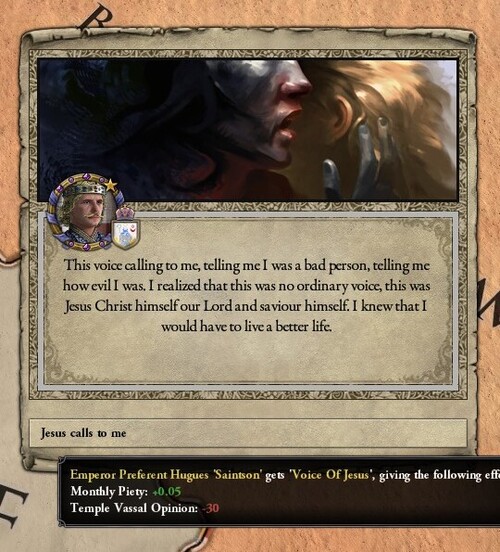|
   To save on headaches in our recently gained egyptian lands we must also get rid of some unnecessary titles, as they are redudnant to ones we already own and could lead to unfortunate shenanigans. Destroy the Kingdom title of Egypt. The titular protector title of egypt has done us fine so far.
|
|
|
|

|
| # ? May 3, 2024 18:03 |
Ralepozozaxe posted:We would also like a map of both ours and our opponents lands, so as to get a better grasp on our dangerous situation.  
|
|
|
|
|
   Also, despite the Mongols fall, we've heard tell of horrifying stories of their raiders still being about. Let us pray that they aren't true. 
|
|
|
Was asked for a vassal map too -  
|
|
|
|
|
 Tora Estrid Princess of Asyut and defender of the Nubian borders, Wishes for this sad conflict with our distant cousin Prester Jane to end as soon as possible, as the last Bastions of Christendom in the world should not be at war
|
|
|
|
Bring me the head of this "Prestor John" or his unconditional surrender. We shall not abide by insurrection in Our realm!
|
|
|
|
   I know a thing or two about siege warfare, let me tell you, and we are in for some rough times ahead. If we want to stand a chance against these odds, we'll have to fight smart. Consolodate our troops via our boats and rivers as quickly as we can, and try to fight a defensive battle on a province of the New Catholic faith to raise our spirits, preferable with us on in defensive terrain. Buy mercenaries as need be. And please, don't fight big battles in Baghdad again. That poor bread basket is still recovering from the previous wars.
|
|
|
|
I don't think we're officially in session yet.
|
|
|
|
Aziz III is ready to ride for the empire! If any of the previous families don't take a slot, I think the Andirsuns would likely be interested in getting in on the Nile action.
|
|
|
 Chapter 45 – The War with Prester John – 1360 to 1380 Always in the seediest tavern, always on the tongue of liars, always at the edges of Christendom, these were the places that Prester John lived. There have always been rumours of his great conquests and vast realms – but they were only ever that, rumours. He is a legend, perhaps based on a man that lived and warred long ago, but so heavily contorted and inflated that he may as well have sprung from the mind of a storyteller. So imagine my surprise when a hundred thousand warriors crying his name flooded across the Indus.  That was what they screamed when they smashed into the desperate levy raised by the King-on-the-Indus – Presbyter Johannes! Aymer! Yaroshalem! Yaroshalem. The place they claimed descent from. The place they vowed to conquer. The first battle in the War with Prester John was a massacre. Tens of thousands of soldiers flooded to reinforce the fighting, immense elephants clambered through the bloodied waters of the Indus, and Prester John won the field.   And so the Indias were lost.  The lords of the Indus fled and the survivors of the massacre followed, escaping into Persia with gruesome descriptions of the vicious bloodletting that this Prester John had unleashed on their lands. We heard their words, and all the might of Persia, Mesopotamia, Armenia, Arabia, Greece and the Holy Land was gathered to meet this foe. And a host that boasted 75,000 levies, commanded by the Pope-in-Persia in the second battles against Prester John, fought and repelled him once… and twice… and thrice…    But these victories would prove to be mere faints, a taste of what was to come.   Because the fourth time that the forces of the Pope faced the hordes of Prester John, he brought the full strength of his vast empire with him, cleaved our armies apart, and crushed them in detail.   And so Persia was lost.  The lords that managed to escape the killing fields made their way to Baghdad, where the remnants of our once-mighty host was gathering. The days became weeks and weeks became months, but not a man amongst them doubted that Prester John would come; and when he came, there would be only death. And indeed, five long years after the defeat in Persia, Prester John crossed the River Tigris with a force of 65,000 behind him, and clashed with our 50,000 levies in the vast floodplains between Tigris and Euphrates.   The gruff and capable Prince of Mosul held command, but amongst his army were many veterans of the battles in the east, soldiers who had finally learned their lesson – against Prester John, there can be no victory.   All the same – they fought and died on the banks of the Two Rivers, surrendering their land only after it was soaked with their blood. And so Mesopotamia was lost.  The world was in uproar. Only a few years after reaching her greatest territorial extent, Jerusalem was viciously castrated – India laid to waste, Persia set afire, Mesopotamia brutally ravaged, with only Egypt and the Holy Land surviving… and even then, for how long? How long? Prester John is coming, ever and always. Will the Holy City be his as well? Would the smallfolk of Jerusalem turn out to see his priests make miracles? Will he bow in the Holy Sepulchre in prayer to his twisted mockery of God? It was all too much, too much.  So I retreated. I turned away from my advisors and lords – constantly prattering about our losses here and badgering on our defeats there, piling problems onto me without a solution in sight. I abandoned them all, and turned to prayer… And when my retreat ended, only a few days later, I was no longer myself.   I was stronger, I was wiser, I… I spoke with the Voice of God. And as God, I knew that I was invincible. So when word reached us that Prester John had been sighted to the north, crossing into the Holy Land at the head of 80,000 fanatics, I rejoiced even as others quailed in terror. I took up my sword, and for the first time in this decades-long war, I took to the battlefield in person.  41,162.  All the remaining strength of Jerusalem was gathered here, and it numbered 41,162. Standing before them, I could see every frightened face and mournful soul. I could see the high lords of the realm, beaten but unbroken. I could see streamers and flags everywhere – the proud lions of Blaiddyds alongside the dragon of Marash; the tattered parrot of Carpenel near the flame of Melikah; the fleur-de-lis of Abrão side-by-side with the bull of Torchitoriu; the banners and crests of Oegstgeest, Rammala, Toulouse, Margrave, Cornouaille, Thermidor, Ahriman, Dreaux, Asqalan, Erez Sender, Blois, Ua Briain, Comborn, Estrid, Brienne, Montseguir, ben Asher, Cynwrig, Cathay, Konopka, Mersir, Radnor, Redvers, Ammar, Ruben, Ivrea, l’Ours, Avaugour, Edfu, Safaga, Shabibid, Andirsun, Shukrid… Arrayed before me was three hundred years of Jerusalem.                                        Taking command over this holy army, I marched to meet the forces of Prester John. His vast armies were encamped near the town of Akkar, and so it was decided that there would be the battle to decide our times. Messengers and emissaries were executed – there could be no negotiation – and after a night of rest, the opposing armies were drawn up and deployed. 40,000 sons of Jerusalem. 80,000 fanatics of Prester John. And in the blistering heat of the 28th of August, 1478, they clashed.  Arrows thudded into dirt and flesh as the first blows of the battle were exchanged…  Steel crashed into steel and meat as foes grunted and wrestled in the heat of the fighting…  Knights charged to their doom as war elephants stampeded man and horse alike, both sides seeking a desperate edge in the struggle…  A desperate edge that is finally won when the knights of Jerusalem gather for another swinging charge, a charge that somehow penetrates the ironclad lines of Indian heretic, a charge that splinters enemy formations, a charge that stumbles into a confusion of man and horse and elephant and... Prester John.  And so Jerusalem was saved. 
|
|
|
|
|
Wait, what?
|
|
|
|
HUGHES HUGHES HUGHES HUGHES HUGHES HUGHES HUGHES HUGHES!
|
|
|
|
We can negotiate antebellum peace with Jane now, we can end this war right now by releasing her. Let's not do something foolish
|
|
|
|
Deus Vult!
|
|
|
|
A convenient bookend to Godefroy's hearing the Voice of God back in the Second Crusade:quote:
|
|
|
|
Pax Slaanica
|
|
|
 Chapter 46 – East and West – 1380 to 1390 He had loomed so large in our imagination. And indeed, Prester John was tall and broad-shoulder, with long hair coiled beneath a gem-studded turban, jewels glittering at fingers and neck, precious daggers and knives strapped to thighs and arms. He was the very picture of the menace that had terrorised Jerusalem for a decade – and all this time, he was a she!  There could be no doubt it – proud, fearless, indomitable, she commanded the utmost attention from everyone surrounding her, even as she was bound in chains and pulled from the battlefield. And this master over all the lands stretching between the Hindu Kush and Cathay, this force of nature, this Prester John – was now in my charge, and I could dictate the terms for peace. They would not be lenient.  Whilst negotiations were underway in Jerusalem, the lords and princes of the Empire were finally permitted to return to their territories. Some would face the immense task of reviving their ravaged lands – especially in Persia and India – whilst others quickly settled back to the status quo, old rivalries and enmities quickly springing back to the forefront.      Even the houses of Marash and Blaiddyd had temporarily set aside their ancient feud to face Prester John in battle…  …only to ignite yet another war over the Galilee scarcely a day after the victory – a war that would stretch across fourteen years and claim the lives of the lords in both Damascus and Palmyra before being decided.     And of course, it wasn’t long before their children raised their parents’ swords in the same, never-ending struggle.   Oh yes, Jerusalem was back. I even found the time to attend one of the tourneys celebrating our victory – a tourney I handily won, of course. I only needed to brush my enemies with my lance to send them stumbling from their horses! Knighting myself proved a bit trickier, though.   But it wasn’t long before I was drawn back to the capital, where the terms for peace between Jerusalem and Prester John were finally hammered out, centred on three clauses – First – the payment of an immense war indemnity that would refill our coffers and allow the realm to recover.  Second – the return of all lands seized during the wars of the past decade, alongside the ceding of further territories in India to compensate the King-on-the-Indus and King-on-the-Horn for their devastating losses.  And third, and perhaps strangest of all – a promise of peace and alliance between the Empire of Jerusalem and Kingdom of Prester John, a promise to be sealed in marriage, between myself and her.  The first two terms were immediately accepted – some said that Prester John muttered in strange tongues and raved in the voices of her ancestors, but even she understood the price of defeat in battle. Over the last term, however, she tarried. Unbeknownst to the court in Jerusalem, this Prester John had in fact been married six – six – previous times, some for love and others for politics, but always with an eye on the future… And as the years crept by and she remained heirless, her husbands would find themselves accused of treason, or stabbed in the back, or falling from balconies. One way or another, she would have a son.  But now, here she was, married and widowed six times over, and still without a son. And there I stood, young and victorious, offering her freedom and alliance. After a few days of consideration, she finally agreed.  And within the week, the betrothal of Emperor Hugues to Prester John was proclaimed, binding together East and West in holy matrimony.
|
|
|
|
|
Ralepozozaxe posted:HUGHES HUGHES HUGHES HUGHES HUGHES HUGHES HUGHES HUGHES! I repeat myself.
|
|
|
|
Absolutely beautiful dynastic feuding, brings a tear to your eye it does.
|
|
|
 Chapter 47 – Miracle Makers – 1390 to 1400 I am in love.  It started slowly, with the exchange of words and learning of tongues. She picked up on Outremer quickly, and within a few weeks were swapping stories of our childhood and boasting of our exploits. There has never been a woman like her or a man that could match her, I am convinced. Who else could conquer an empire stretching beyond the horizon whilst authoring treatises and codes? Who else could deal judgement to entire nations while breeding strange beasts back into the world? Who else could bring the mightiest empire this world has ever borne – Holy Jerusalem – to its very knees?  And we are so, so alike. Where I was imprisoned in a tower, she was driven into exile. Where I resorted to assassination to retake my crown, she relied on spears and war elephants. Where I am the word and hand of the Almighty, she too hears the voice of her God. Oh yes, it wasn’t very long before I was spellbound.  The priests of Oriental Christianity are known as Miracle Makers, and are known for their preparation of spells, calling down the favour of Angels… and even the brewing of love potions. So imagine my confusion when, only a day before we were to married in the Holy Sepulchre, she came to me in tears, rambling about impossibilities and absurdities…  She was pregnant, and I could not be the father… In those moments after hearing her words, there was only a blinding surge of emotion – anger, panic, nausea, horror, disgust, fur– And suddenly it stopped, and everything made sense. Of course. That could be the only explanation.   She was Mary come again. I was her Joseph. And our unborn baby was… a miracle. We were married the very next day, with all the lords and ladies of the Empire bearing witness to this union between East and West – but only her and I knew that in her belly, she carried the heir to that union.  And with the two greatest empires in the world now bound by matrimony and alliance, the years that followed would become known as the Great Peace. Of course, politicians still plotted and politicked…     And lords still waged their petty feuds…     And there was the occasional war of conquest…  But there was also the recovery of ravaged lands, the rebuilding of ruined cities, the construction of great projects...      The great peace even allowed for the mingling of ideas and faiths, and though our victory over Prester John finally solidified the hold of Reformed Christianity in the Holy Land, challenged only by Orthodoxy stemming from a revived kingdom in Constantinople, Oriental Christianity slowly gained a strong following in the Indias and even Persia.  That said, my own bliss would be short-lived. My newlywed wife was forced to depart Jerusalem just a few months after uttering her marriage vows – she still had her vast empire to administer, after all, and was bent on completing her conquest of India. But without her, I wasted away, drinking and eating and whoring to fill the hole she left behind.    So when a distraction turned up in my court, even in the form of base gossip, I jumped at it…  There was a warlord on the rise, apparently, finally filling the void of chaos and infighting and irrelevance that had followed the collapse of the Great Mongol Empire, which once stretched from Yurp to Cathay, and beyond to lands unknown. Such conquerors are common enough, but this one seemed to be a tad more ambitious – in addition to declaring himself Son of Heaven and Emperor of China, he began making some very dangerous claims…  And when a wandering knight turned up in Jerusalem a few weeks later, swearing on Bible and God to have seen our most holy relic with his own two eyes, it set the city afire. The Crown of Thorns – that wire of barbed twigs and thorns that pierced the brow of Christ during his crucifixion, that relic that had been trusted to Godefroy God-chosen by Archangel Gabriel, only to be gifted to a pagan emperor by his descendants, and then lost to the barbarous Genghis Khan in the decades that followed, disappearing from all history and time… Until now.  The news spread quickly, and ambitious lords and roaming knights flocked to Jerusalem, many beseeching me to fund another Quest for the Crown… but that wasn’t enough. Instead, in the simmering summer heat of 1395, Emperor Hugues summoned his royal court for a proclamation – spread the word and gather the knights, he declared, for it was time for one last crusade…  The Crusade for the Crown. And so the preparations were made, maps were charted, lords were summoned and crusaders were gathered. I couldn’t leave without seeing my wife one last time, however, so I marched with my royal court to the town of Kandar, sitting on the border of the Empire of Jerusalem and Kingdom of Prester John. There, my wife was waiting with her most powerful lords and her young son – Godefroy.  My wife didn’t protest our Crusade all that much, and by sunset we were feasting and drinking – and where they had once traded in steel and blood, the princes and kings of Jerusalem now swapped stories and jokes with the rajas and maharajas of India. In that town, on that night, East and West were united. Until I stood, taking young Godefroy into my arms, to make a final proclamation.  Breaking with law and tradition, in full view of the most powerful lords of East and West, I raised Godefroy over my head and proclaimed him – heir to the Empire of Jerusalem, heir to the Kingdom of Prester John, and miracle-born son of God. The very next day, the Crusade took its first steps towards Cathay.
|
|
|
|
|
So this is all a dying dream, right?
|
|
|
|
QuoProQuid posted:
Wait, poo poo, when I said to take a trip east I didn't mean—!
|
|
|
|
I was hoping China would eventually come up again
|
|
|
|
ALL KNEEL BEFORE YOUR FUTURE KING AND MIRACLE CHILD OF GOD!
|
|
|
|
The son of the virgin Prester Jane shall surely lead the armies of the faithful against the Dajjal. I fully support this crusade to regain his crown, forced on him as a humiliation before, which shall be worn in triumph as he scatters the infidels in the name of Allah!
|
|
|
|
Slaan posted:ALL KNEEL BEFORE YOUR FUTURE KING AND MIRACLE CHILD OF GOD! Truly a living Saint. Josselin smiles down upon you today!
|
|
|
|
Ok let's wrap this up...
|
|
|
|
 Chapter 48 – The Crusade for the Crown, aka the Last Crusade – 1400 to 1430 March 2nd – a raid is launched over the Amu Dara, and a large party of iron-armoured men fall upon the small town that lays on its banks, screaming in strange tongues and putting the entire populace to the sword.  September 27th – acting on the orders of God and his disciple on earth, roaming bands of knights set the countryside of Turan aflame, clashing with nomads and peasants to seize the food and supplies they need.    December 17th – beneath the vastness of the Himalayas, thousands of crusaders wearing crosses and circlets of twigs-and-thorns battle with skirmishers and peasants, driving them into a desperate retreat.  Just five years after departing Jerusalem, those crusaders, knights and petty lords managed to secure the key passes and passageways into the immense plateau shadowed by the Himalayas, seizing the villages and terrorising the populace as they marched ever-eastward.  But those victories were merely the first battles of a much greater war, perhaps the greatest war ever fought. Because by 1410, the dragon in the East was finally roused, and the great captains of Cathay were raised to meet, fight, and crush this so-called Crusade for the Crown, by order of the Son of Heaven.  As has been proven time and again, however, crushing the will of Jerusalem is not so easy.   With the dawn of the campaigning season of 1414, the Crusade for the Crown numbered an immense 100,000 crusaders, divided into five armies and commanded by Emperor Hugues himself, along with his bastard sons and the few lords that gone into the east with him. And facing them in the great plateau were 200,000 soldiers from Cathay, commanded by the Protector-General Yushi – the voice and will of the Son of Heaven, here in the west.   God surely marching with them, Jerusalem moved for first blood with the spring thaw of 1414, dispatching a force of 10,000 knights to engage a larger army of 20,000 on the sandy outskirts of Qangtang.  And after a few hours of skirmishing, those 10,000 knights were reinforced by another 20,000 foot and archers flying Jerusalemite banners.  Yushi retaliated by sending another 20,000 of his own troops to join the fighting…  And when the sun set on the deserts of Qangtang, it was Jerusalem who was in full retreat.  At the same time, hundreds of miles to the south, another battle was raging underneath the colossal reach of Gimmigela Ghuli, the twin peaks of the Himalayas.  And again, following a series of reinforcements on both sides, the white banners of Jerusalem were retreating from another vicious mauling at the hands of Yushi’s soldiers.   And the casualties at Qangtang and Gimmigela Ghuli would be joined by thousands more after another crushing defeat further east...   And every single one was necessary. Hugues de Safaga was no fool – casting his mind back to the wars with Prester John and the brilliant strategies she had utilised to seize India, and Persia, and Mesopotamia. And so – even as three of his armies were fighting and dying – the Emperor marched through a narrow mountain pass at the head of another force, and plunged straight towards Khyundzong, where Yushi himself held camp.  And there, the Emperor himself – wearing white armour and a great helm of golden twigs and iron thorns – led a vicious charge of 50,000 crusaders into the mass of unsuspecting Chinese, and put the entire army to rout.  In the midst of this crushing victory, Protector-General Yushi managed to escape and flee into his mountain-fortress to the east – Lhunzhub. And in close pursuit was another strong force led the knights of the Crown – 10,000 lances smashing into the shields and scattering the swords of the army that Yushi gathered at Lhunzub…  …but this battle would not be another simple rout, because that was when Yushi sounded the trumpets that summoned another 50,000 reinforcements into the battle, scattering our charge and turning the ambushers into the ambushed.  There could be no retreat, however, not this far east… And so we fought on, fought beneath the unforgiving sun and fought against the endless ranks, we fought until another influx of reinforcements flooded onto the field of battle, this time from the west.  And buoyed by another charge that came with the falling sun, 50,000 sons of Jerusalem slowly advanced against 50,000 sons of Cathay, until their knees buckled and swords shattered and survivors were put to rout, trampling the corpses of their compatriots in haste to flee the killing fields.  Victory.  A single victory, the histories would record, but that victory was quickly followed with a forced march to the foothills of Lamaling, where another 30,000 troops that had been marching to reinforce the battle were pinned, surrounded and crushed.   Only 12,000 would survive that massacre, escaping to the nearby depot at Bome to warn their compatriots – it was not until the next morning that they realised they’d been allowed to survive and allowed to escape, only to lead a host of 50,000 crusaders straight to their next victory.   That victory was soon compounded by another at Lhomar, where the second son of the King-on-the-Indus led a frenzied charge of war elephants that stampeded 15,000.   Followed by 18,000 deaths at Gerze, where the twin sons of the prince of Sana’a were killed in gruesome battlefield duels, martyrdoms that turned the tide of the battle and won a bloody victory for Jerusalem.   From the Horns of Tibet to the Great Eastern Desert, swords were raised, battle-cries were sounded, battle was met, and men were killed... Until, by the dwindling days of 1418, over 250,000 lives had been lost to the Crusade for the Crown, and it was high time to finally end the farce. So as another campaigning season was underway, 50,000 crusaders – veteran knights that had survived the forced marches, freezing winters, endless skirmishes and ambushes and sieges and battles of this last crusade – slowly wound their way towards the stronghold of Dunhuang, where Protector-General Yushi had been holed away in these past few years.  The remnants of his once-mighty host were scattered, siege weapons were constructed, the great fortress was seized and the prospering city was sacked –even the Colossus of Cathay, an immense statue depicting the emperor of China in his all his might, was torn down and replaced with the form of Hugues de Safa, the White Knight of Jerusalem.  And with that, here in the plateaus and deserts between empires, the strength of Cathay was finally broken… It was then, with the beginnings of a bitter winter in the year 1418, nearing the impressive age of 100, that Hugues de Safaga disappears from the histories and archives. The steady train of loot and riches that ambled towards Jerusalem slowly trailed, the envoys to the Haute Cour eventually dwindled, the love poems and affectionate letters to Prester John came to a sudden end. In the holy city sitting on the crossroads of the world, the lords and princes of Jerusalem would say that the Emperor-Preferent had finally died…  …but in the taverns and saloons, in those places where rumour spawned and hearsay flourished, they would say that the White Knight marched ever-forward and ever-eastward, marched until he stood upon the ends of the earth, donned the Crown of Thorns, and declared himself the Emperor-of-All-Under-Heaven. 
hashashash fucked around with this message at 18:41 on May 24, 2021 |
|
|
|
 Chapter 49 – A Disputed Succession – 1430 to 1440 The Emperor is dead! The White Knight is killed on Crusade! The Haute Cour meets in Jerusalem to decide on his successor! The Emperor is dead! It was proclaimed in cities and muttered in taverns, sprawled onto paper and shouted from parapets, and by the cold mornings of January in 1420, peasant and lord alike were certain that their Emperor, living to the venerable age of 100, was finally dead.  Hugues de Safaga had been gone a long time, and though the lordships and princedoms of Jerusalem had always maintained a considerable degree of autonomy, the years and decades that followed the Last Crusade saw them become nigh-independent. In fact, in absence of a strong authority in Jerusalem, plots and assassinations became commonplace…          Dynastic feuds and ancient claims flared into conflicts that raged across years and cost thousands of lives…             Wars over the Galilee became a yearly occurrence…     And even the very soul of Christendom became the victim of dynastic quarrels, with no less than four wars fought over claims to Popehood…     But throughout all of that, the Peace between East and West had held… Until the death of the Emperor. It was several weeks before the news reached Viraja, the splendid capital of the Kingdom of Prester John, where the great-aged Prester John herself ruled.  And upon being informed that the lords of Jerusalem were meeting to elect his successor, she was not pleased. Why? Only a few days before the departure of the Last Crusade, Emperor Hugues had declared her only son – Godefroy – as the heir to East and West and miracle-born son of God, a blatantly obvious scheme to establish a dynasty in the Holy City. And while his father went a-crusading after the Crown of Thorns, Godefroy grew in the court of his mother, tutored by Eastern priests before travelling to Jerusalem for an education in the Imperial Academy. By the time he reached manhood, he was well-taught in arts, philosophy, mathematics, poetry, theology, medicine and military strategy – something of a prodigy, by all accounts.   But the lords of Jerusalem would never accept him as Emperor, not if he was imposed upon them. Instead, meeting in the Hall of the Haute Cour in the early days of 1434, they proclaimed the prince of Arabia Petrae – Thiebaut d’Avaugour – as their newly-elected Emperor-Preferent…  …and after word of this proclamation reached Vijraja, Prester John issued a proclamation of her own – that Godefroy God-son was the only heir to Jerusalem, and until he sat his throne in the Holy City, the Great Peace between East and West was null and void.  Raids across borders and rivers were launched, shipping in the Great Ocean was sunk, plots were hatched and conspiracies were hatched. War was on the horizon. In the years and battles to come, some would say that Prester Jogn elicited devilish means to lengthen her life, having her witch-priests make miracles on her behalf. Others would insist that Prester John was old and sickly and ready to die, any day now. And everyone else would know that Prester John simply refused to die, not until she marched into Jerusalem as a conqueror. 
|
|
|
|
 Chapter 50– The Progress of Jerusalem, aka On the Eve of the Great Medieval War – 1440 to 1444 In the Holy Sepulchre, under sight of God and Godefroy, Thiebaut d’Avaugour is crowned Emperor-Preferent of Jerusalem and Her Dominions in an extravagant ceremony.  That same night, the son and heir of Emperor Hugues – Young Godefroy – flees to his mother to the East, whereupon Prester John was said to have flown into a great rage, vowing to install her son in Jerusalem with force and blood. The Great Peace is over. Young and energetic, the newly-elected Emperor will not wait for Prester John to march on his territories. Instead, Thiebaut calls a great gathering of his vassals – the Kings and Princes and Lords of Jerusalem, bidding them to summon their knights, raise their levies, and march for God and Empire against the great threat in the East.  And determined to raise the largest host in the history of Jerusalem, the Emperor-Preferent departs on a great tour to rally support for his cause, a years-long journey that will see him sup with vassals, make marriages, form alliances, and attempt to unite the disparate provinces of Jerusalem under a common banner.  The Kings of the Empire Foremost and strongest of the feudal lords in Jerusalem are the Kings, those once-minor lords of ignoble families that have, through sheer ambition and audacity, managed to receive official recognition of their kingship from Jerusalem. Ruling in the mountainous terrain of the north is House Abrao, Kings of Armenia. Though they claim descent from a wide array of legendary figures, they have come to adopt local customs (and religions) in the many centuries since they crowned themselves Kings in Armenia.  But successful families breed ambitious sons, and a cadet branch of House Abrao have wrested control over Azerbaijan from the main dynasty in Armenia, ruling as Princes on the Caspian.  House Abrao: Treasury – Bloodlines I – Bloodlines II  The houses of Abrao are in frequent conflict with the family that rules in the fertile lands between Tigris and Mesopotamia – House Cornouaille, Kings-between-the-Rivers…  …though they too are forced to deal with cadet branches challenging their dominant, with the Princes of Mosul and Princes of Kurdistan both refusing the call to arms, likely hoping they can make a play for the dynastic seat of Sinjar whilst the King-between-the-Rivers campaigns in India.   House Cornouaille: Treasury – Bloodlines  Strongest and richest amongst these Kings, however, is surely those that rule in the east. House Carpenel, Kings-on-the-Indus, were the first and most successful of the crusaders-turned-adventurers, carving themselves a mighty kingdom on the banks of the Indus. House Carpenel has become a influential House in the Empire, erecting a great library in their capital, constructing a large navy to control the seas, and even marching on Jerusalem to seize the Emperorship.  House Carpenel: Treasury – Bloodlines  Inspired by the success of the Carpenels, House Ildegarde soon followed as Kings-on-the-Horn-of-India. Fabulously wealthy and far flung from Jerusalem, strange cultures and sects have blossomed in their realm, but both Carpenel and Ildegarde have seen their lands ravaged by Prester John in the recent past, and are only too eager to join the coalition against her.  House Ildegarde: Treasury – Bloodlines  These kings may be powerful and influential, but they are also far and few in between, with most of the Empire instead being governed by the Princes – feudal lords that still cling to ancient rivalries, battling and plotting and intermarrying in their attempts to prevail in their petty feuds. The Province of the Caucasus Sitting on the Black Sea is the northernmost of these lords, House Torchitoriu de Ugunale, Princes-on-the-Black-Sea, an ancient family that once ruled as Princes of Edessa and even Kings of Armenia. Now, they look to expansion into the Caucasus and along the Black Sea, where weak tribes and lucrative riches await.  House Torchitoriu de Ugunale: Bloodlines  They are bordered by relative newcomers on the west, with House l’Ours, Princes of Trebizond, inheriting lands in the region after a series of marriage pacts and suspicious deaths.  House l’Ours: Treasury – Bloodlines  Another newcomer has settled in the west, with the late Emperor Hugues granting this small parcel of land to his mistress before departing on his crusade, leaving a bastard to inherit him as House de Safaga, Princes of Kartli.  House de Safaga in Caucasus: Treasury – Bloodlines  The Province of Mesopotamia-and-Persia The largest and richest of the Princes lay to the east, installed in the aftermath of the Persian Crusades, including amongst their number House Guhilot, Princes of Fars, an infamous family founded by the adventurer-turned-usurper Ahriman, who ruled as Tyrant in Jerusalem.  House Guhilot: Treasury – Bloodlines  In the mountainous interior of Persia, House de Brienne rule as Princes of Jibal, a family of mixed fortune that can claim an Emperor and three Popes amongst their numbers, not to mention a brief tenure as Kings of Abyssinia.  House de Brienne: Treasury – Bloodlines  And further north is another legacy of Emperor Hugues – House de Safaga, Princes of Daylam – his attempt to secure his lineage before departing on his ambitious and dangerous crusade for the crown. Proud and arrogant, he refuses to join with the Emperor, instead foolishly declaring that he will lead another crusade into the east, this time to conquer India for Christendom.  House de Safaga in Daylam: Treasury  These lands in Persia are vast but largely poor, making them ideal targets for raids from further west, where House Egge-Thermidor rule as Princes of Baghdad. Famed for their outrageous wealth and wondrous building projects, the Egge-Thermidors also claim the title of Protector in the East, a once-weighty office that has slowly devolved into an ornamental honour.  As with the other large dynasties of Jerusalem, however, the Egge-Thermidors have also fallen into infighting and civil war, with a cadet branch rebelling against Baghdad and establishing themselves as Princes-on-the-Gulf. Eager to secure backing from Jerusalem, they promise moneys and knights for the war effort.  House Egge-Thermidor: Treasury – Bloodlines  And finally, sandwiched between all of these powers are the domains of the Papacy, an office that once held unquestionable authority over the souls of all those who lived in Jerusalem. That is no longer the case – with intrigues, fornication, kinslaying, and the brutal killing of the last direct descendent of Godefroy God-chosen all tarnishing the authority of the Papacy. Emperor Thiebaut did not waste his time with that quagmire. They may still be given lip-service, but the days where Popes crowned Emperors and called Crusades are long over.  Papacy: Treasury – Bloodlines  The Province of Egypt To the west are the Princes of Egypt, descendants of those same lords that were displaced when the Nubians invaded from the south, surviving in exile in the minor holdfasts around Jerusalem, with their grandchildren reconquering their ancestral castles a century later. Egypt has become a land of fierce rivalries, dominated by House de Blois, Princes of Alexandria, descended from one of the founding crusaders that marched alongside Godefroy God-chosen. Since then, members of that distinguished dynasty have served as counts in the Holy Land, Princes of Alexandria and Arabia Petrae, and even a King and Queen of Jerusalem.  House de Blois: Treasury – Bloodlines  They are challenged by Princes further up the Nile, including House de Comborn, Princes of Faiyum, who are intensely dedicated to the Old Catholic creed that has declined in popularity across the rest of the Empire.  House de Comborn: Treasury – Bloodlines  Holding the key roads that lead into Libya is House Ua Briain, Princes of Paraetonium, descended from the Kings of Munster and Lords of Dublin, and one of the loudest voices amongst those that call for renewed crusades into Africa and Yurp.  House Ua Briain: Treasury – Bloodlines  Guarding the border with Nubia is House Estrid, Princes of Asyut. Founded by the eighth son of the King of Denmark in the aftermath of the Second Crusade, the Estrids would quickly become a prolific dynasty, counting amongst their number Counts, Princes, Doges, Grandmasters, and most famous of all – King Severin Lionheart, and his descendant Joakim of the Gilded Goose.  Across the Nile, the enemies of the Estrids were traditionally situated at Aswan, where a series of marriages and inheritances saw the principality change hands between House d’Este, House Blaiddyd, various Nubian families, and House Ghisi before the Estrids finally achieved their longstanding ambition, and seized the stronghold for themselves.  This union would only last a generation, however, with Asyut and Aswan inherited by differing branches of the Estrid family upon the death of Princess Tora. House Estrid: Treasury – Bloodlines  On the strategic waterways where the Nile empties into the Mediterranean, meanwhile, are the wealthy patrician families whose alliance forms the constitution of the Republic of the Nile, the oldest and greatest of the Jerusalemite republics. Famed for their role in crusades, civil wars, and the building of the Kingsriver, the Nile Republic was destroyed in the Nubian invasions and only revived a century later, by which time it became increasingly dominated by the Thermidor family.  Nile Republic  And sitting on the roads into Egypt is House Dreaux, Princes of the Sinai, an isolated family that seldom leave their desert strongholds. They are rumoured to hold to illegal practices and even allow Jaffite heretics to harbour in their realm, but so long as the Dragon of the Sinai keeps secure the routes to and from Egypt, they are tolerated.  House Dreaux: Treasury – Bloodlines  Finally, surrounded by the aforementioned Princes on every side, and enemies of them all, House Erez Sender rules as Princes of Cairo. Infidels swimming in a sea of crusaders, the Erez Sender have managed to survive through the generations by clever politicking, immense bribes and desperate last stands, succeeding in creating a Jewish enclave in the very heart of Egypt.  House Erez Sender: Treasury – Bloodlines  The Province of Arabia Poorer than many of the Principalities in the rest of the Empire, the lordships of Arabia have gained notoriety for the heresies that have blossomed across the peninsula, turning the province into a patchwork of contradicting religions and rivalled faiths. The richest and largest of the powers in Arabia is surely the Red Sea Republic, an alliance of five families that have used their dominance over pilgrimage and trading routes to become one of the most influential voices in the Empire, even eclipsing their mother-republic in the Nile. The spread of the Mahometan heresy has significantly damaged their reputation, together with their failed attempt to seize Jerusalem during the second civil war and disastrous invasions into the Arabian interior, and the Republic now looks to expanding their outposts in Africa and India to recoup their losses.  House Andirsun: Treasury – Bloodlines House Shukrid in Arabia: Treasury House Shabibid: Treasury – Bloodlines House d’Cathay in Arabia: Treasury House Thermidor: Treasury – Bloodlines      They are bordered on the south by House Montseguir, Princes of Sana’a, a family known for keeping their neutrality in the many wars that plagued the peninsula, though that hasn’t stopped them from descending from their mountain-strongholds and meeting their enemies in battle whenever threatened.  House d’Montseguir: Treasury  Near them is House ben Asher, Princes-on-the-Straits, a far-flung Jewish dynasty that watches over the trade that pours through the Straits of Mandeb.  House ben Asher: Treasury  Across the barren desert of Hadhramaut is House Cynwrig, Princes of Musqat and Protectors of the South. The only power in Arabia that can rival the Red Sea Republic, the Cynwrigs are infested with Nestorian and Messalian heresies whilst permitting Ibadis, Manicheans and even Hindus to live under them in peace!  House Cynwrig: Treasury  And finally, on the other side of the peninsula sits House d’Avaugour, Princes of Arabia Petrae, charged with guarding the roads that span Jerusalem and Mecca. The d’Avaugours are the only dynasty in Arabia that can prove their descent from Godefroy God-chosen, doubtless one of the leading factors that led to their elevation to Emperorship.  House d’Avaugour: Treasury – Bloodlines  Province of Greece Conquered by the Knights Hospitaller over the course of centuries and countless wars, the fortunes of these formidable knights have declined ever since their defeat in the second Civil War, with their mainland territories shrinking to only the Peloponnese. Now, their seat of power lies on the large island sitting in the Mediterranean, where they have become known as the Knights of Krete.  Knights of Krete: Treasury  The power vacuum in the rest of Greece has been dominated by a rivalry between Athens and Thessalonika, with House d’Cathay holding sway in the south as Princes of Hellas, with their multicultural and multireligious court at Athens has become the very epitome of decadence, perversion and corruption.  House d’Cathay in Greece – Treasury I – Bloodlines  Their ambitions are only held in check by the soldier-princes that rule in the north, House Konopka, once a minor family of patricians in the Nile Republic and counts in the Holy Land, now risen to become Princes of Thessalonika and Epirus.  House Konopka: Treasury – Bloodlines  Whilst their neighbouring dynasties engage in brutal wars for supremacy in Greece, House Mersir have come to dominate the seaways as Princes of the Aegea, using their naval supremacy and trading wealth to fund campaigns into distant lands, seizing outposts and founding colonies all along the coasts of Yurp.  House Mersir: Treasury – Treasury II  These conquests are at least partly funded by the wealth of Cyprus, where another aristocratic republic has been erected, charged with expanding Jerusalemite trade and influence into the West, where their ancestral homeland lays ravaged and lost.  Republic of Cyprus  And ruling as the westernmost lord that answers directly to Jerusalem, is House Radnor, Princes of Cephalonia and Protectors of the West. Known for their isolation, the Radnors have recently broken with longstanding tradition by embarking on their first campaign, succeeding in forcing the knights in the Peloponnesus into submission and transforming themselves into a regional power.  House Radnor: Treasury – Bloodlines  Province of India Though certainly dominated by the Kings-on-the-Indus and Kings-on-the-Horn, a few enterprising adventurers have managed to seize lands and lordships for themselves, including the descendants of lords that once ruled in the Holy Land. House Redvers, Princes of Bhakkar, have carved for themselves a vast realm stretching down the Indus. Ever since their seizure of Bhakkar, they had intervened in the affairs of surrounding rajas and maharajas, but the invasions of Prester John had changed everything – ravaging their lands, killing their prince, and sending his family into exile. And with the peace between East and West now splintering, they are determined to repay that ravaging in full.  House de Redvers: Treasury – Bloodlines  Descended from a second son of Blaiddyd, House Bleiddud rule as Princes of Stravani in a small parcel of land serving as a buffer between the Kings-on-the-Indus and Kings-of-the-Horn. Their small holdfast will serve as the final rallying point of the armies of the Empire, the springboard from where Emperor and Empire hopes to invade, and defeat the Kingdom of Prester John.  House Bleiddud in India: Treasury  Lost Provinces Remnants of the many adventures and crusades into the old continent of Yurp, the Lost Provinces are those distant and isolated regions that, though governed in the name of Jerusalem and Emperor-Preferent, are ruled as near-independent realms of their own. Foremost amongst these lost provinces is the Oresund Republic, the last of the aristocratic republics founded by Jerusalemite families. Situated to dominate trade in the north, but surrounded by enemies on every side, their future is clouded in uncertainty.  Closer to civilisation is the province of Italy, where Mersir and Carpenel adventurers have carved new realms from the savage barbarians that now dominate Yurp. Nevertheless, contact with Jerusalem is scarce, and the petty lords ruling here harbour dreams of uniting Italy under their dynasties.  Furthest of all are those territories conquered by the Crusade for the Crown, with many of the crusaders that went east never returning to their homes and holdfasts in the Empire, instead settling in these fertile lands with new wives, new families. Only rumour and hearsay about this distant realm reaches Jerusalem, igniting the imagination with talk of strange cultures, immense battles, magical artifacts, new continents. Whether any of it is true, we may never know.  Province of the Holy Land And at the very centre of the world, ruling from Holy Jerusalem, are the Princes of the Holy Land and their Emperor-Preferent. All of them claiming direct descent from Godefroy God-chosen, these influential dynasties are amongst the founding crusaders to seize Jerusalem in 1099. On the edges of the Holy Land, House Rammala were once only Barons of a small holdfast called Rammala, but through careful alliances and occasional conquest have managed to become Princes of Aleppo.  House Rammala: Treasury – Bloodlines  On their west is House Oegstgeest, and having suffered untimely deaths and crushing defeats in battle, they have seen their territories shrink to the lands around Antioch alone. Still, they hold one of the richest cities in the Empire, and are surely looking to reclaim their inheritance from the usurpers...  House Oegstgeest: Treasury – Bloodlines  …House Shukrid, whose recent conversion to the Mahometan heresy has seen zealots flock to their cause, quickly put to use in seizing the right to rule from the Oegstgeest and proclaiming themselves Princes of Alexandretta.  House Shukrid in the Holy Land: Treasury  Watching over these shifts in fortune is House de Toulouse, Princes of Tripoli and self-proclaimed Protectors of the North. Founded in the First Crusade by Raymond de Toulouse, this influential dynasty have been at the heart of the many civil wars plaguing the realm, counting Lords and Princes amongst their number, but never a King or Emperor.  House de Toulouse: Treasury – Bloodlines  The feuds amongst these families are overshadowed by the ancient hatred between House Marash, Princes of Palmyra and House Blaiddyd, Princes of Damascus. Their rivalry has spanned centuries, stretching back to the very founding of the Crusader Kingdom by Godefroy God-chosen, or so their histories claim. A mere disagreement back then, a brief argument surrounding the partition of their conquest, has led to a dozen wars and countless deaths over the right to rule in Galilee.   Their most recent war has ended in favour of Palmyra, but not even a year passed before Damascus raised levies and mercenaries and plunged the Holy Land into war again. This is a feud that may never be settled, not without the extinction of both dynasties. House Blaiddyd: Treasury I – Treasury II – Treasury III – Bloodlines House Marash: Treasury – Bloodlines   Before the earliest of the Galilee Wars, however, it was House Rubenid who ruled as Princes of the Galilee. In the centuries since their principality was seized by Marash and Blaiddyd, the Rubenids have survived and prospered as Lords of Tyrus and Beirut... but they have not forgotten their ancient claims to Galilee.  House Rubenid: Treasury – Bloodlines  Further south are the principalities of Ascalon and Oultrejourdain, with House Daula reigning as Princes of Ascalon and House Margrave as [/b]Princes of Oultrejourdain[/b], occasionally warring over the castles and forts situated on the Dead Sea.   House Daula: Treasury I – Treasury II – Bloodlines House Margrave: Treasury – Bloodlines   It is not only princes who rule in the Holy Land, however, with several Lords granted the privilege of direct fealty to the Emperor in Jerusalem, such as the Ammarids of Baalbek, the Ivrea of Negev, the l’Ours of Almafraq, the Hautevilles of Acre, the d’Cathay of Xin Xi’an, the Redvers of Irbid, the Brienne of Beersheb, and the Carpenels of Hebron.       House Ammarid: Treasury – Bloodlines House Ivrea: Treasury – Bloodlines House Hauteville: Bloodlines    And so we come to the turning of an age. In the barbarian-overrun lands of Yurp, economies and institutions are emerging amongst the sea of horselords and republics. In the pagan realms of Cathay, a thousand petty kings vie for supremacy, with their endless battles on sea and land giving rise to sweeping advancements in military technology. In the unexplored continents beyond the sea, exotic visitors bring horses, guns and diseases with them, transforming their world into something new. But to those that live in the Holy Land, none of that matters. Jerusalem has changed as well, with great wars and destructive conflicts transforming the old Crusader Kingdom into a wild, tumorous Empire. But… dynastic feuds and religious war, clandestine intrigue and devious politicking, feudal rule and autonomous princedoms, all these things have entrenched into the very fabric of Jerusalem… Time marches on, and the future beckons – wars will be fought, realms will be destroyed, dynasties will be extinguished, but Holy Jerusalem will withstand it all, a fossilized remnant of the Medieval Age. 
hashashash fucked around with this message at 21:05 on May 24, 2021 |
|
|
|
|
my family’s ignoble decline will all have been worth it so long as da qin still lives... right?
|
|
|
|
My bloodline technically died, but the Horn Plan is still basically a success!
|
|
|
Rody One Half posted:My bloodline technically died, but the Horn Plan is still basically a success! The Ildegardes were basically a cadet branch of the Melikah anyways, iirc, transmitting along a female or something
|
|
|
|
|
My house found the crown of thorns and proclaimed themselves emperors of China, ruling from a porcelain throne. This is obviously the true ending of de Safaga
|
|
|
|
Glory be to Eternal Jerusalem, may you only get couped by a Carpanel in EU4
|
|
|
|
Good luck getting this to run on 1.31 
|
|
|
|
Actually re-reading this update, did we actually get the crown, and where is it now?
|
|
|
|
Crusade of the Clown! Wait. That's not right.
|
|
|
|
Ralepozozaxe posted:Actually re-reading this update, did we actually get the crown, and where is it now? I don't think we did. And at this point, the Crown is a loving magic macguffin that's gonna lead up to at least 5 different colonial ventures (at least half which will go up in flames immediately)
|
|
|
|

|
| # ? May 3, 2024 18:03 |
|
What a beautiful end to a beautiful LP. Thanks for the great time, Hashim.
|
|
|

























